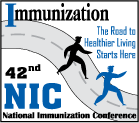
|
|
CDC NIP/NIC Home Page
|
Monday, March 17, 2008 - 3:35 PM
26
Adoption of the New Rotavirus Vaccine by Pediatric and Family Medicine Physicians
Allison Kempe1, Umesh D. Parashar2, Matthew F. Daley1, Shannon Stokley3, Lori A. Crane4, Manish Patel5, Brenda L. Beaty6, Sandra R. Black6, Jennifer Barrow6, and Miriam Dickinson7. (1) Department of Pediatrics, University Colorado Denver, Children's Outcomes Research Program, The Children's Hospital, 1056 E. 19th Avenue, Denver, CO, USA, (2) Centers for Disease Control and Prevention, (3) National Center for Immunization and Respiratory Diseases, Centers for Disease Control and Prevention, (4) Preventive Medicine & Biometrics, University of Colorado Denver, (5) NCIRD/DVD/EB, (6) Colorado Health Outcomes Program, University of Colorado Denver, (7) Dept. of Family Medicine, University of Colorado Denver
Learning Objectives for this Presentation:
By the end of the presentation participants will be able to describe adoption of rotavirus vaccine by Pediatric (Peds) and Family Medicine (FM) physicians.
Background:
In 2006 a new rotavirus vaccine was licensed for use in infants <6 months.
Objectives:
To assess among Peds and FM reported: 1) rates of adoption, 2) knowledge regarding ACIP recommendations and 3) perceived barriers to use of the new vaccine.
Methods:
Survey administered 8/2007-9/2007 to Peds and FM physicians participating in a network representative of the national organization for each specialty
Results:
Response rates were 84% for Peds and 79% for FM (N=623). Among Peds, 85% routinely offered vaccine, 3% offered but not routinely and 11% did not offer; Among FM 45% offered routinely, 14% not routinely and 42% did not offer the vaccine. 69% of Peds and 30% of FM (p<.0001) knew the recommendations for timing of the first dose and 62% of Peds and 32% of FM (p<.0001) knew the age by which all three doses should be completed. Factors identified as “definite” barriers included lack of coverage by some insurance companies (FM 22% Peds 19% p=NS ), up-front costs of the vaccine (FM 22% Peds 17% p=NS), lack of adequate reimbursement for the vaccine (FM 18% Peds 15% p=NS), physician concerns about the safety of the vaccine (FM 25% Peds 9%, p<.0001) and concerns about adding another vaccine to vaccine schedule (FM 22% Peds 5%, p<.0001).
Conclusions:
The rates of adoption of the new Rotavirus vaccine are much higher among Peds than FM. Knowledge of recommendations is also higher among Peds, although significant gaps in understanding are seen in both specialties. Both specialties identified financial barriers to adoption of the vaccine, but FM had significantly more concerns about safety and about the addition of another vaccine to the schedule.